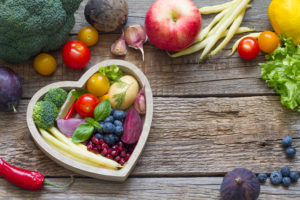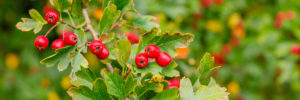Heart Health for 55 and over communities in Ocean County, NJ
Heart health awareness is important for 55 and over communities in Ocean County, NJ and becomes even more critical for 65 and over. In this article we aim to provide an overview of the heart and risks associated with it along with food, herbs and habits that will nourish and support the health of your heart.
The Heart: A Wee Anatomy Lesson
The heart is a cardiac muscle, slightly larger than a closed fist. According to Atlas of the Human Body by Takeo Takahashi, this muscle contracts and relaxes regularly to pump blood through the body. The interior is divided into four chambers: left and right atria and left and right ventricles. The heart also has four valves, which ensure that blood doesn’t flow in the wrong direction.
The heart pumps arterial blood—blood that is rich in oxygen and energy—from the left atria through the body. As the blood circulates through the body, it picks up waste, such as carbon dioxide, which is a by product of energy consumption in various organs. When this blood returns to the heart through the right atrium, it is called venous blood.
The blood is then pumped to the lungs where it releases excess carbon dioxide and picks up oxygen, which it carries to left atria of the heart and is again pumped out to the body as arterial blood.
The heart itself is gets oxygen and nutrients not from the huge amounts of blood that it pumps in and out of the lungs, and through its chambers, but from a collection of veins called the coronary arteries which surround the great muscle. The heart uses massive amounts of oxygen—about 70% of what pumps through these veins which serve it—compare this to the 15%-20% of oxygen that the abdominal region uses of what flows through.
The heart is therefore particularly susceptible to oxygen deficiency, which can happen if the coronary arteries are blocked (more on this below).
The pumping of the heart is controlled by an electrical system which controls heart rate and coordinates contractions of the various chambers. A heart beats roughly 60-70 times a minute at rest and the speed nearly doubles during exercise.
What happens to the heart as we age?
Like the rest of our bodies, our heart naturally ages, and with age, certain risk factors are enhanced. For one thing, while the strength and pace of the heart rate generally remain the same at rest no matter the age, it does tend to beat with less force and speed during exertion or while under stress, the older it gets. Another common aging change is arteriosclerosis, in which the large arteries harden, leading to high blood pressure (aka hypertension).
Another age-related heart ailment can be a result of changes in the electrical system which monitors the proper pumping of the heart. This can lead to arrhythmias, or irregular heartbeats—either too fast, too slow or irregular.
Another major cause of heart disease is a buildup of fat—or plaque—in the coronary arteries that feed oxygen to the heart. This condition is also known as atherosclerosis and is more common in elders as the buildup of plaque happens over many years. When the coronary arteries are blocked, less blood—and thus less oxygen and nutrients—are able to get to the heart. As mentioned above, the heart needs a lot of oxygen, so a significant reduction of this vital component leads to angina (or pain in the chest) and weakening of the heart cells, which can die off and eventually lead to heart attack.
Atherosclerosis is not necessarily a part of aging as it can often be avoided by attention to the diet. That’s why it’s extra important for 55 and over communities in Ocean County, NJ to give extra support to the heart through a healthy diet and lifestyle.
Exercise & Stress Management
Exercise and stress reduction are perhaps so regularly chanted as essential for prevention of a vast number of diseases, that the rallying call has become trite and easy to skim over. However, exercise and stress management are truly at the heart (pun intended) of heart health.
Regular exercise is irrefutably essential for the heart. The heart is a muscle after all, and it needs to be worked to stay strong. More than that, the blood needs to move. Exercise gets the heart pumping and thus also gets our life giving blood flowing. Exercise does not need to be intensive, though endurance exercise is the best for heart support. For some exercise suggestions in Barnegat, read our article on how to stay active for 55 and over communities in Ocean County, NJ.
Likewise, lowering stress will have profound benefits to overall health. Meditation, evening strolls, yoga, long baths—whatever relaxes you, do more of that.
Diet for Heart Health
First and foremost, include plenty of fruits and vegetables in your diet. A full rainbow of fruits and vegetables will provide a full spectrum of healthy nutrients. For example, carotenoids, found in high concentrations in carrots, help to fight free radicals. And vitamin k, found in high concentrations in leafy green vegetables, supports arterial health and lowers blood pressure.
Fruits and vegetables also contain healthy doses of fiber. According to the mayo clinic, foods high in fiber help to lower cholesterol in the blood and may also help to reduce blood pressure and inflammation as well. Whole grains are also high in fiber and are a great heart support.
Another super friendly heart food is fish. Fish is high in Omega 3 fatty acids which helps reduce inflammation throughout the body. Inflammation can damage blood vessels and has been shown to lead to strokes and heart failure.
The Mayo Clinic suggests eating at least 2 servings of fish per week to maximize the benefit. Alternatively, you could also take a daily fish oil supplement. While eating fish has been shown to have the highest benefit to the heart, flaxseed, walnuts, chia seeds and green leafy vegetables also contain omega 3.
Garlic is also a very handy food for the heart and a tasty one to include in the daily diet. Garlic improves cholesterol levels and according to Medical Herbalism, by David Hoffman, “garlic also possesses antiplatelet effects, or an ability to inhibit unnecessary clotting within the blood vessels. It appears to work by reducing the “stickiness” of blood platelets, decreasing platelet aggregation and inhibiting the release of clotting factors in the blood…an exciting finding indicates that garlic works selectively, inhibiting the synthesis of enzymes involved in plaque formation while sparing the vascular synthesis of important prostaglandins.”
Also consider foods to avoid:
Salt, or sodium, for example, is essential to a healthy diet. However, as people age, they become more sensitive to salt. Excess salt intake can lead to higher blood pressure. Essentially, salt in the blood stream pulls water to it, so the more salt, the more water, and the more water, the greater the pressure. According to heart.org, over time, high blood pressure can lead to overstretched or damaged blood vessels which leads to a build up of plaque…which blocks the blood flow and forces your heart to work harder.
Saturated fats, found in high fat dairy and red meats, and trans-fats, found in processed foods, raise cholesterol levels which can prove a challenge for the heart, while unsaturated fats are healthy (in moderation).
Herbs for Heart Health
Herbs that have an action on the heart are called cardiac remedies. Some herbs can have a strong specific effect (like speeding up the heart rate) while others are nurturing tonics. The herbs mentioned here are all tonic—these herbs are gentle and supportive heart allies that can be taken daily without adverse risks. You can drink them as teas, tinctures or, as with hawthorn, eat them as a food!
 Hawthorn (Crataegus lavigata)
Hawthorn (Crataegus lavigata)
Hawthorn is perhaps the most beloved heart plant because it is both so effective and tastes so yummy—making it both pleasurable to take and easy to remember. Hawthorn berry is the most used part of the plant, but actually the leaf and flower contain medicinal benefits as well. High in both flavones and flavonoids, which have the potential to lower blood pressure and cholesterol, hawthorn is a natural cardiovascular system support.
According to Hoffman, “in 1994, the German Federal Ministry of Health published a monograph officially recognizing hawthorn as a heart remedy…perhaps most significant was the finding that hawthorn has no side effects or contraindications.”
Hawthorn berry conserve smeared on toast in the morning is a delicious way for 55 and over communities in Ocean County, NJ to incorporate this healthy heart herb.
Reishi (Ganoderma lucidum)
Reshi is known as the mushroom of immortality in Chinese, and no wonder: this mushroom is chockful of beneficial constituents. It supports immune function as well as heart function and is deeply nourishing and balancing to the entire human organism. It is antioxidant and anti-inflammatory and some studies show regular intake of this supplement improves a variety of heart conditions.
Motherwort (Leonurus cardiaca)
Motherwort is a wonderful herb that is often turned to for nervous or anxiety induced heart problems, especially heart palpitations. As Hoffman notes, motherwort is “an excellent heart tonic, strengthening without straining.”
Linden (Tilia platyphyllos)
Like motherwort, linden is specified for heart conditions that are triggered by the nervous system, as it is a relaxing nervine and has an affinity for the cardiovascular system.
Take Care of Your Heart
For 55 and over communities in Ocean County, NJ, exercise, diet, herbal teas and supplements are all fantastic for maintaining heart health. Also be sure to schedule regular visits to your doctor to monitor your blood pressure, heart rate and overall health. For more on how to find the right doctor, read our article on the topic here.
If you want to live in a healthy and happy environment, consider renting a condo at Barnegat 67.

